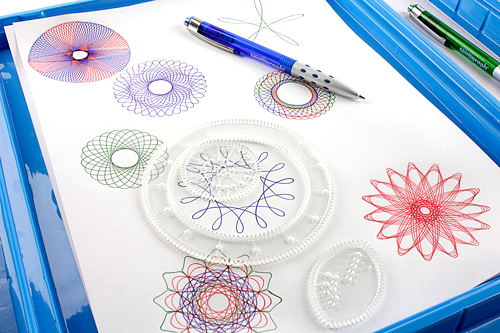Spirograph was invented by Denys Fisher in the early sixties. Spirograph's geometric patterns were beautifully in tune with the swinging sixties. Like the Lava Lamp, the timing of its launch in 1965 was perfect. Spirograph won Toy of the Year and was the top selling toy in America in 1967. It is still available today, as MB Spirograph in the UK and Hasbro Spirograph in the US.
Denys Fisher was an engineer who supplied precision components to NATO in the early sixties. His passion though, was a Victorian idea for creating patterns using cogs and wheels. He tried to improve on what the Victorians did using Meccano gears during the Christmas break of 1962. However, his first attempt was unsuccessful. His original idea came whilst he listening to Beethovens Ninth Symphony. His inspiration was to use a series of perforated cogs and racks, into which a pencil could be inserted. Denys Fisher's original intention was to market Spirograph as draftsman's tool, but he later decided it would sell better as a toy.
Spirograph first went on sale in 1965. Its geometric and swirling patterns chimed perfectly with the Op Art and geometric designs that were popular in the 60s. It also fitted in fantastically with the psychedelic patterns of the later swinging sixties.
Spirograph was featured on the BBC children's programme, Blue Peter, and very soon was selling in large numbers. In the first four years Spirograph took the turnover of Denys Fisher's company from 30,000 to 3 million.
The original Spirograph had a series of large and small cogs, wheels and racks. It was supplied with four coloured pens in black, red, blue and green. You could buy special Spirograph paper for drawing on.
You placed the special paper onto a corrugated cardboard base. Then pinned one of the large wheels or racks to the paper, using drawing pins supplied with the Spirograph. Then one of the smaller geared cogs was lined up against the larger cog or rack and a coloured pen was inserted into one of the smaller cog's holes. You then turned the smaller cog, using the pen, which then drew the Spirograph pattern. A huge variety of different patterns were possible. The instructions gave you some examples, but many more combinations could be produced with experimentation.
Spirograph was a very creative toy. Denys Fisher's creation was loved by adults and children alike. Newspapers and magazines recommended it as an marvellous toy for older children. Spirograph won the Educational Toy of the Year three years running from 1965 to 1967 and became Toy of the Year in 1967. The original version cost 1 15s 6d [about 23 in today's money] from Hamley's in 1966.
Spirograph was a top selling toy in Britain and America. It became the number one selling toy in the US for Christmas in 1967, beating another British company, Lesney, whose Matchbox cars, were previously America's top selling toy.
Spirograph was so successful that it started to influence the world of fashion. Op Art and geometric prints were already popular, but Spirograph patterns appeared on evening dresses in black and white printed crepe by John Cavanagh in 1966.
Denys Fisher sold his company in 1970. It was eventually bought by Hasbro. Spirograph is now manufactured by MB Games for the UK market and Hasbro for the US market.
The Spirograph
 Reviewed by CREATIVE SCIENCES
on
August 31, 2018
Rating:
Reviewed by CREATIVE SCIENCES
on
August 31, 2018
Rating:
 Reviewed by CREATIVE SCIENCES
on
August 31, 2018
Rating:
Reviewed by CREATIVE SCIENCES
on
August 31, 2018
Rating:








